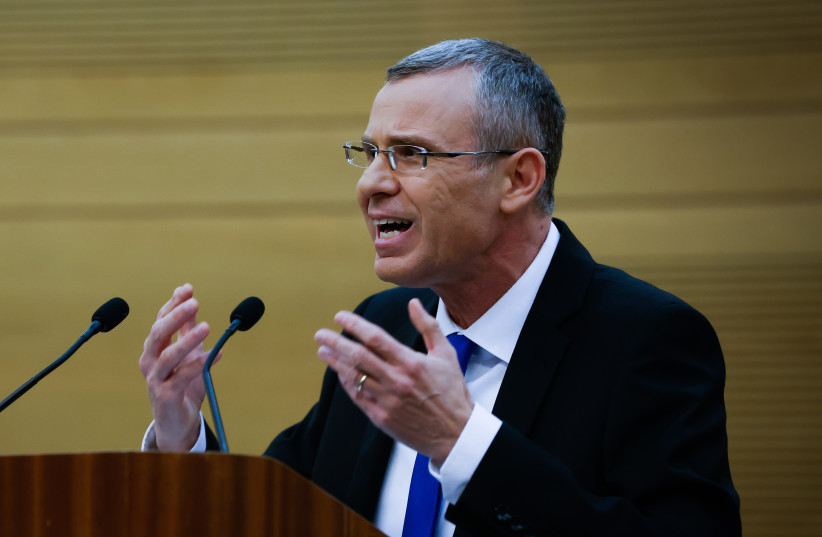Israel's new gov't must be careful with judicial reform - editorial

Let’s learn from these lessons, hold a sincere dialogue and be open to learning from the other side. This is what being a democracy is really about.
Thousands of Israelis gathered in Tel Aviv on Saturday night to protest the judicial overhaul proposed by Justice Minister Yariv Levin.
The speeches and slogans were passionate, calling the reform plan a “coup d’état.”
But let’s step back for a minute and look at what is really happening. First, at the most basic level, the fact that a demonstration like this can take place – and it received broad media coverage – is a sign that democracy in Israel is alive and kicking.
Second, and more importantly, judicial reform is not a bolt out of the blue. There is no surprise. Levin has been working on his ideas regarding the judiciary for years, and the Likud, which won the largest number of seats in the last elections, included judicial reform on its platform as did the Religious Zionist Party, its top coalition partner.
Everyone knew judicial reform would come to Israel if Netanyahu won the election
The appointments by Prime Minister Benjamin Netanyahu – of Levin as justice minister, Amir Ohana as Knesset speaker, and Simcha Rothman to head the Knesset Constitution, Law and Justice Committee – are an indication that this was his intention. All three are lawyers who for years have called for changes in the justice system.
While it is easy to put the focus of the reform on Netanyahu’s own legal woes, the voices calling for judicial changes predate them. For years, the Right rallied against what it saw as “legal activism” by then-Supreme Court president Aharon Barak in the 1990s, under which the courts assumed more power to overturn laws passed by the Knesset, sometimes using the undefined term “reasonableness.”
As the courts became more activist, the political backlash grew. Oft-cited examples of the Supreme Court’s overreach include the four occasions when it overturned decisions concerning illegal migrants, and when it canceled Knesset legislation on drafting ultra-Orthodox citizens into the military.
So while it is perfectly legitimate to protest – people should always be allowed to do so in democracies – no one can honestly claim they did not know this was coming. The reforms were an integral part of the election, and the Likud as well as the RZP did not hide their intentions. People cannot now claim they were not aware this was the plan. What they should understand now is that voting or not voting has consequences. In a democratic system, there are winners, and when those winners establish a government, they often gain the authority and ability to implement the changes they seek.
Nonetheless, this does not mean that the government should simply dismiss what the opposition has to say. The protest on Saturday night – which drew more than 10,000 people to Habima Square in Tel Aviv – is just one example of how a large segment of the Israeli public finds these reforms scary and dangerous. People are afraid of the loss of basic civil rights. Combined with extreme remarks made by some members of the new government about the LGBT community, for example, their concerns are not baseless.
In addition, even with the legitimacy to implement them, it is important for the coalition to recognize that these judicial reforms are significant. They have the potential to change the character of the State of Israel and the balance of power between the state’s different branches. This is why dialogue is needed between all the different stakeholders. Such significant, far-reaching change needs to be done while hearing everyone who might be affected, ensuring that as few people are disenfranchised as possible.
Levin has said that Rothman’s committee will hold hearings and invite all the relevant stakeholders and interested parties to voice their opinions. We hope this will happen. The more the government engages with the public, the easier it will be to accept change. In addition, we call on the government to be open to modifying its plans. Rejecting one side is part of what brought Israel to this point.
Let’s learn from these lessons, hold a sincere dialogue and be open to learning from the other side. This is what being a democracy is really about.
Jerusalem Post Store
`; document.getElementById("linkPremium").innerHTML = cont; var divWithLink = document.getElementById("premium-link"); if (divWithLink !== null && divWithLink !== 'undefined') { divWithLink.style.border = "solid 1px #cb0f3e"; divWithLink.style.textAlign = "center"; divWithLink.style.marginBottom = "15px"; divWithLink.style.marginTop = "15px"; divWithLink.style.width = "100%"; divWithLink.style.backgroundColor = "#122952"; divWithLink.style.color = "#ffffff"; divWithLink.style.lineHeight = "1.5"; } } (function (v, i) { });

